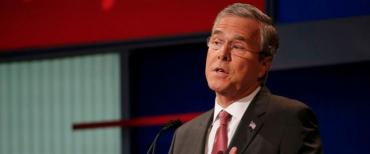
Thursday night’s Republican debate on Fox News was illuminating in many respects -- viewers saw the voracity of Donald Trump’s presidential ambitions (when he said he would run for the position even as an independent candidate); Rand Paul and Chris Christie exchanged jabs over national security; and Jeb Bush -- who knew it was coming -- was forced to dip his toes into the controversial waters of Common Core.
As the debate went on, it almost appeared Bush would skate by without that tricky question on his national education standards position. Common Core has been the subject of intense GOP criticism in recent years.
But nearly an hour into the debate, up popped a question on CCSS. It was posed to Bush, one of the only active GOP candidates still supporting the standards.
"I don’t believe the federal government should be involved in the creation of standards directly or indirectly, the creation of curriculum or content," a tense Bush responded when asked about Common Core. "It is clearly a state responsibility."
Bush has generally held tight to the hand of Common Core, but it was evident Thursday that his position has put him in rough waters without a paddle among his GOP cohorts.
By neither condemning nor approving of the standards, Bush is attempting to reach a happy medium. He wasn’t necessarily giving up on the standards entirely, but instead decided to set up camp between one position and another.
The other position opposing CCSS was made loud and clear by another Florida politician vying for the presidential nomination, U.S. Sen. Marco Rubio. Rubio made no excuses for Common Core Thursday, leaping at the opportunity to lay into the standards.
So why does Rubio think Bush is wrong on Common Core?
"The Department of Education, like every federal agency, will never be satisfied,” Rubio said. “They will not stop with [Common Core] being a suggestion. They will turn it into a mandate."
Rubio’s response highlights a stark divide over Common Core in the Republican Party. Bush basically built Florida’s education system, lifted it out of the bottom quarter in the nation and while he was governor propelled it virtually to the top. While it’s not entirely perfect today, the state’s graduation rates have improved and the "A" to "F" school grade process has been lauded and adopted in many other states around the nation.
Bush’s legacy is evident. Without a question. But Bush’s foundation as an “education governor” doesn’t change the fact he’s one of the few (and the only one at his level) who still is onboard with the standards.
Most candidates have already flipped the script on Common Core, due to its growing unpopularity.
New Jersey Gov. Chris Christie backed out of the standards despite agreeing to adopt them with many other state governors in 2010. Wisconsin Gov. Scott Walker also agreed to the standards during his first term as governor, but he, too, abandoned them.
Support for Common Core has also grown unpopular in Bush’s home state of Florida. Despite the state’s adoption of the standards, even the Florida Department of Education has taken many steps to distance itself from CCSS, tweaking then rebranding the standards under a different name.
Local groups have been quick to criticize Bush’s opinions on the standards, claiming he only started acting cordial with them once he put his name in the ring to become the GOP nominee.
“Jeb Bush called those who opposed Common Core ‘conspiracy theorists’ and only started respecting us when running for president,” wrote the Florida Stop Common Core Coalition, one of Florida's leading voices against CCSS.
In 2013, Bush said conspiracy theories were “easy attention grabbers” and urged opponents of Common Core to come up with solutions. For years, they’ve been fighting tooth and nail to get the standards out of schools nationwide.
In the meantime, Bush teeters a fine line on what could potentially be his Achilles heel, knocking him out of the running when GOP voters head to the polls. While the former Florida governor might shy away from discussing Common Core directly, he made it clear there’s still more to accomplish to make the nation’s education system truly great.
“We spend more money on education than any country on Earth, save for a rounding error, but 30 percent of our kids graduate college or are career ready,” Bush said Thursday. “We have to do better.”
Reach Tampa-based reporter Allison Nielsen by email at allison@sunshinestatenews.com or follow her on Twitter: @AllisonNielsen.


